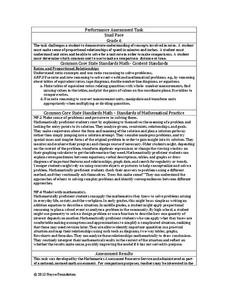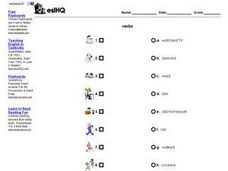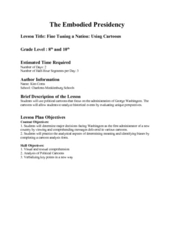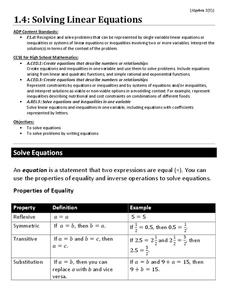Curated OER
Grass as Biomass
Students explore energy properties by listening to a sustainability lecture in class. In this biomass activity, students identify what biomass is, how it can be transformed into a usable energy and how it complements the energy cycle....
Noyce Foundation
Snail Pace
Slow and steady wins the race? In the assessment task, scholars calculate the rates at which different snails travel in order to find the fastest snail. Hopefully, your class will move much more quickly in finishing the task!
Curated OER
To Quote or Not to Quote
Introduce your middle and high schoolers to the correct use of quotation marks. They identify examples of correct and incorrect quotations in magazines and edit a paragraph in groups. Use this lesson as a way to reinforce proofreading...
Curated OER
Life With Energy
Students consider different forms of energy. In this energy instructional activity, students investigate different forms of energy. Students explore the advantages and disadvantages of these forms of energy.
Curated OER
Extreme Elevations
Seventh graders use highest and lowest points of land elevation around the world to find the differences. Sea level is zero, so students be operating with positive and negative numbers. After students find the information on the...
Curated OER
Coast-to-Coast Book Design-Part 1: What is a book?
In this first of four lessons on book design, young scholars are introduced to the vocabulary of book design through the use of bookwalks and a non-linear PowerPoint presentation in game-show (Jeopardy!) format.
Curated OER
Desert Views: First Impressions
Students are introduced to primary source material and the ways in which early travelers viewed aspects of the desert environment. The lesson addresses the geography themes of location, region, and human/environment interaction.
Curated OER
Who's On First?
Have you ever considered why the number 10 is so important to us? That's what learners do here. They explore patterns formed by powers of ten and by decimals, convert units of measure within the metric system, and express these in the...
Curated OER
Presidential endorsements: Newspapers decide
Twelfth graders collect, organize, evaluate and synthesize information from multiple sources in order to draw logical conclusions. They communicate this information using appropriate social studies terminology in oral, written or...
Curated OER
Comparing Cities and Their Common Functions
Ninth graders begin the lesson plan by watching a PowerPoint on the functions of cities. In groups, they use the internet to research various cultures throughout history and the cities that were formed at the time. They present their...
Curated OER
STAR Deputies, Unite!
Second graders work in small groups to brainstorm solutions to safety situations. They use the STAR safety model worksheets and role play as STAR deputies. Based on the scenario presented on the worksheet, they develop skits that show a...
Curated OER
This is the Way We Go To School
Second graders create and utilize a graph using the Excel computer program. They gather data regarding how the students get to school, tally the numbers for the class, and create a bar graph on paper and using Excel.
Curated OER
A Garden of Verses: Poems About Class Gardens
Young scholars explore botany by participating in a language arts activity. For this garden poetry lesson, students read the classic poem "Mary, Mary Quite Contrary" and discuss the imagery and rhyming methods used. Young scholars...
Curated OER
Word and Picture Match-- Verbs
The focus of this ESL worksheet is on matching verbs and pictures. Students analyze seveb pictures that depict people engaged in various activities, and match each picture to the verb that describes it.
Curated OER
Agriculture & Alaska's Economy
Learners examine Alaska's agriculture numbers from previous years. They answer questions based on Alaska's production levels.
Curated OER
Dinosaurs
Students are introduced to the various types of dinosaurs and write in their journals about their favorite one. After listening to a story and watching a filmstrip, they color a few pages in their Dinosaur Friends Book. They also examine...
Curated OER
Making an Argument: Effective use of Transition Words
Work on using transition words in context by prompting elementary and middle schoolers to write their own persuasive essays using transition words. They explore new forms of transition words and examine how they are used in an editorial...
Curated OER
ESL Picture/Idiom Matching Worksheet
In this ESL picture to idiom matching worksheet, students examine 7 small clip art images before matching them to the idioms they best represent. They work with idioms such as "blood is thicker than water," and "as you make your bed, so...
Curated OER
Dance, Dance, Dance
Use dance and song to help your charges in adding whole numbers to 10. In this adding to 10 instructional activity, learners become the manipulatives as you add them.
Curated OER
Fine Tuning a Nation: Using Cartoons
Students examine political cartoons to gain an understanding of the political issues that George Washington faced. In this historical perspectives instructional activity, students analyze political cartoons about the National Bank, the...
Curated OER
Discovery Research of Quadratics
Students investigate the properties behind the quadratic equation. For this algebra lesson, students identify quadratic equation in the real world. They graph the parabola and identify the vertex and intercepts.
Curated OER
Renewable Energy Sentences
Students construct sentences using nouns and verbs from a "renewable energy" word bank. In this cross curriculum ecology and sentence structure grammar and mechanics instructional activity, students listen to the book Our Earth: Clean...
Curated OER
Solving Linear Equations
Use this activity for practice or review solving linear equations in one variable. Problems range from multiple-step problems involving parentheses and combining like terms, to word problems, to equations with no solution or infinitely...
Curated OER
Inductive and Deductive Reasoning
High schoolers use logical arguments and inductive reasoning to make or disprove conjectures. After observing a teacher led demonstration, students discover that the deductive process narrows facts to a few possible conclusions. In...

























